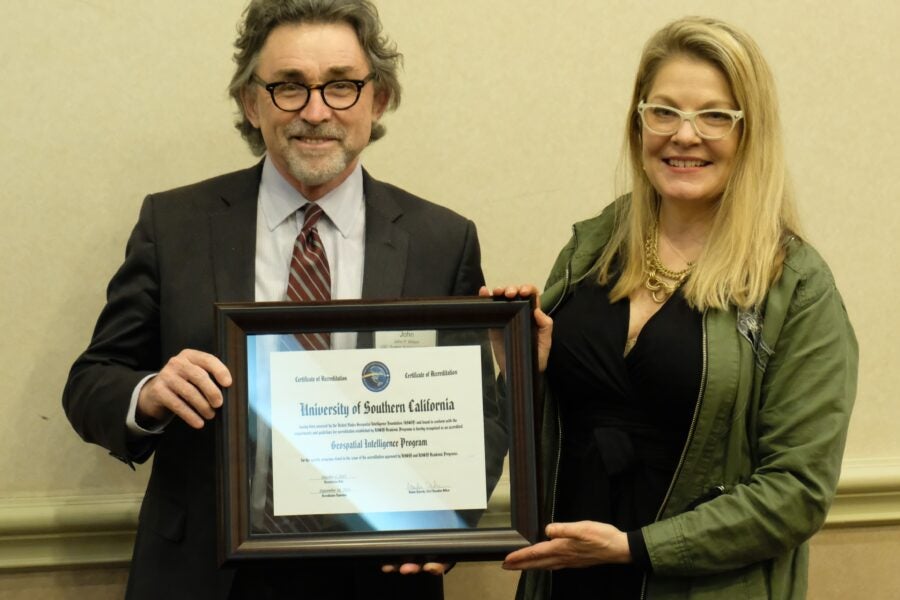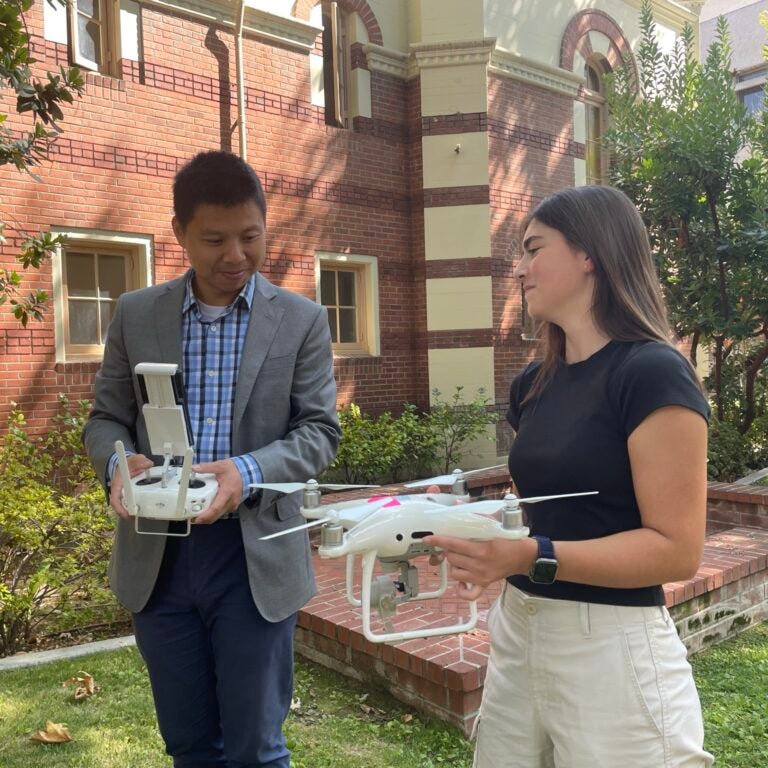“USGIF accreditation means the USC GEOINT academic programs comply with the highest standards for GEOINT curriculum, faculty expertise, novel research approaches, and availability of adequate resources for state-of-the-art teaching and learning, and is committed to continually improving its program.”
United States Geospatial Intelligence Foundation

What can you do with a BS HSGI?
Meet some HSGI alumni and students

Eric Allen, B.S. Human Security and Geospatial Intelligence ’22
It is not often that you encounter an adolescent boy who would run to maps and geography books instead of the most recent edition of Diary of a Wimpy Kid. Growing up, I would often find myself hyper-focused on maps, the Discovery Channel and National Geographic. I was habitually the kid who wanted to be spatially aware of my surroundings.
My interest in human security and geospatial intelligence (HSGI) intensified during three devastating events: the 2011 record-breaking tornado season, Hurricane/Superstorm Sandy (a surreal experience), and Moore, OK EF-5 tornado. By the summer of 2013, I began crafting my life mission in disaster awareness, preparation, management and mitigation.
When I joined the USC HSGI undergraduate program at its inception in January 2020, little did I know how much of an impact the program would make on me. The HSGI curriculum developed and enriched my capabilities within spatial sciences and public policy, while also sparking a passion for international relations.
In my junior year, I participated in the U.S. Department of State INR MapGive internship program under the Virtual Student Federal Services (VSFS) where I showcased all the SSI skills I had developed. We engaged on open-street map platforms to perform edits and additions to remote regions around the world.
In the B.S. HSGI program, my practicum partner, Steven Duncan, and I focused on using GEOINT to assess infrastructure insecurities in Elliott City, Maryland. We used this suburban town as a case study to comprehend why historic towns like this posed a substantial flash flood risk.
As a HSGI major, I was part of the USC Intelligence Community Center for Academic Excellence and was inducted into the National Society of Leadership and Success.
The completion of my undergraduate HSGI degree marked the beginning of my life’s mission toward minimizing the overall impact of natural and manmade hazards when they strike.
After graduating from USC, I attended UCLA’s masters program in applied geospatial information systems and technologies. Along the way, I had a global operations internship with Pacific Disaster Center Global (PDC) in Maui, Hawaii, developing my skills in ArcGIS Pro, StoryMaps and dashboards. In addition, I honed my data processing abilities using FME (Feature Manipulation Engine) and reviewed over 90 PDC-issued products for relevancy, effectiveness, aesthetics, efficiency and branding.
I also have had an incredible opportunity a six-month internship with the Disaster Assessment and Coordination Team at United Nations Office for the Coordination of Humanitarian Affairs (OCHA) at the United Nations headquarters in Geneva, Switzerland.
While at USC and UCLA, I have competed at the Division I level in track and field, achieving multiple All-American honors and conference championships. I served on the PAC-12 Student Athlete Leadership Team and was elected Co-President of the USC United Black Student Athlete Association.
I’m delighted to be returning to USC for an M.S. in Human Security and Geospatial Intelligence. I am passionate about GEOINT, national security, data science, disaster management and risk reduction.

Lindsey Crowe, B.S. Human Security and Geospatial Intelligence ’24
Growing up in the Bronx, I always dreamt of becoming part of something bigger. In 2017, I enlisted in the U.S. Navy and became an Electronics Technician, maintaining Satellite Communications, Radar, and Weapons onboard Naval vessels. In 2020, during the COVID-19 pandemic, my ship was deployed in the 7th Fleet to locations in the South China Sea, and while we were unable to travel in those countries, I developed a desire and fascination for understanding more of the world and the role that the United States played in it.
While traversing the Panama Canal, I was selected for the highly competitive enlisted-to-officer accession program known as STA-21 (Seamen to Admiral). The program enabled me to stay as an active-duty sailor while completing my bachelor’s degree and subsequently commissioning as an officer.
At USC, I chose the Human Security and Geospatial Intelligence (HSGI) major as it uniquely applied to my current career as a future officer in the Navy, giving me a further foundation to understand the world from an academic perspective.
As a member of the U.S. Navy, I am part of a team that ensures peace and security for the United States while bringing our democratic principles and methodologies to the rest of the world. Understanding international border conflicts, past genocidal incidences, climate change and human rights is tantamount to executing our missions with intelligence and compassion for the world.
Following graduation, I will continue my career with the military and using what I have learned in the Human Security and Geospatial Intelligence major and likely a graduate degree, thereafter, proceed towards a future in global intelligence.

Bluesmon del Vecchio, B.S. Human Security and Geospatial Intelligence; Minor in History ’24
Born and raised in North Hollywood, California, I come from a long line of artists, performers, creators, and clowns (quite literally). This creative upbringing trained me to look at the world in unique ways– always questioning, being questioned and digging for deeper meaning.
Early in life I adopted a deep love of history, and found that looking to the past was one of the most meaningful ways of exploring the human condition. One aspect of humanity that fascinated, and eluded me the most was the consistent presence of conflict in human civilization. The more I studied conflicts of the past, the greater my desire became to work to prevent and mitigate conflicts of the future. Setting my sights on diplomacy– an enduring goal– I knew that I would not only need to pursue its academic study, but also its practical application.
I joined the United States Army in 2016 out of a drive not only to learn about the conflict I one day hoped to prevent, but also a desire to serve. My experiences as an enlisted soldier opened the door to a world far broader, and more complex, than I had yet encountered in any of my studies.
As a Civil Affairs soldier, I found myself traveling the world, working in small teams to build civil resilience and infrastructure while de-conflicting military operations with civilian wellbeing. This was a trial by fire in the comprehensive field I would later come to know as human security.
As I worked in a multitude of environments across Europe and East Asia, I also began to learn how interconnected the population was with the land. Geospatial products were essential to understanding and executing my missions, and were the greatest tools in my team’s arsenal of addressing civil problems over wide areas with myriad factors at play.
Returning home after my time overseas, I found a renewed vigor for continuing my education. Finding the HSGI program only propelled that further. Here was the perfect blend of subjects that would allow me to explore both the theory and practice of human security through investigations of international relations, public policy and intelligence, while also developing practical skills in GIS technology, data acquisition and analysis. With this goal, I transferred to USC.
While here at USC I have been able to work towards my professional goals, explore my academic interests, and continue my creative endeavors. Academically, I have invested myself in HSGI, and taken on a History minor which complements the modern analysis of HSGI with the context of the past.
Professionally, I have been able to pursue a commission as an officer in the US Army through the ROTC program, and gained invaluable leadership and management experience in positions like that of Cadet Battalion Commander. Creatively, I have been able to take my experience and develop my interest in screenwriting, producing my first feature film which will soon be available to audiences across the U.S.
I hope to take all I have learned, and continue to explore, using my degree in HSGI as a solid foundation for a life of service, and do my part in creating actionable solutions to the worlds ever changing problems.
Learning objectives
Explain key concepts from humanities, social sciences, mathematics, and physical sciences, and illustrate the relevance of these disciplines to human security and geospatial intelligence at the intersection of the spatial sciences, international.
Communicate evidence-based ideas and articulate positions orally and in writing.
Apply a variety of digital and online geospatial applications including remote sensing applications and geographic information systems.
Synthesize and analyze information to identify geospatial problems and devise solutions related to human security.
Illustrate how the principles and applications of geospatial intelligence can be used in building healthy, livable and secure communities.
Determine how geographically referenced data can be gathered and organized to support a large number and variety of collaborative projects.
Critique how geospatial data can be visualized, analyzed, and modeled to inform human security and planning, and by doing so, support international and national security requirements.
Analyze how various societies co-exist and evolve in human security settings and how globalization connects near and far-away places and actions.

CURRICULUM
PRE-MAJOR REQUIREMENT
-
An introduction to the basic tools of statistics. Descriptive statistics; probability; expected value; normal approximation sampling; chance models; tests of significance.
-
Comprehensive introduction to contending theoretical and analytical approaches; development of critical, evaluative, cognitive, and analytical competencies regarding historical and contemporary issues.
MAJOR REQUIREMENTS
-
The focus is intelligence to improve the making of policy, with attention to collection; overt and covert, operations; domestic intelligence; and oversight in democracies.
-
Develops a framework for understanding public policy and its role in solving current complex issues. Theories, processes and institutions that shape policymaking and professional development for policymaking.
-
Introduction to the complex relationship between human development and natural hazards, which are increasingly causing damage and displacement to human populations throughout the world.
-
Develop the requisite knowledge and practical skills to source, analyze, and produce GIS and simulation-based projects with unmanned aerial systems-derived data.
-
Role of maps and spatial reasoning in the production and use of geographic information for representing and analyzing human and environmental activities and events.
-
Conceptual foundations and techniques of statistics and how they can be used with geographic data to produce actionable information across spatial science domains.
-
The various ways in which geography can be used to acquire, represent, organize, analyze, model and visualize information. Laboratories are organized around ArcGIS software suite.
-
Fundamentals of spatial modeling and remote sensing and how to use GIS customization and programming to streamline complex spatial analysis and modeling workflows.
-
Introduction to basic geospatial intelligence knowledge and related practical applications that assist in informing decision‐making in a variety of human security settings.
PRACTICUM
-
Methods for direct observation and recording of the directly experienced built environment through drawing, diagramming, photographing, and writing. The course includes exercises and field experience.
MAJOR ELECTIVES
Choose four courses (16 units)
-
Examination of the ways that different nations and cultures have remembered the Vietnam War or the American War as it is called in Vietnam.
-
Interdisciplinary study of the pursuit of peace, including causes of wars, arms races, conflict resolution, peace movements, nonviolent resistance, and peace with justice.
-
Key concepts in international security studies; historical evolution of international warfare and diplomacy; contemporary international security issues.
-
Basic concepts and analytical approaches in the study of decision-making at the international level. This is a case-based class, requiring participation of students in interactive discussions of decision forcing and retrospective foreign policy cases.
-
Causes and effects of use and spread of nuclear, biological and chemical weapons; responses to WMD, including deterrence, preventive war, and non-proliferation policies and negotiations.
-
Introduction to the natural and cultural diversity of the Middle East through the prism of globalization and sustainability.
-
Modern political ideologies; their assumptions, perceptions, and prescriptions regarding political stability and social injustice: anarchism, communism, socialism, liberalism, conservatism, and fascism.
-
Interaction between law and politics; overview of the American legal system; value conflicts and public policy questions which arise within it.
-
Overview of human rights controversies across the globe. Introduction to techniques of analysis for social issues, interdisciplinary research methods, and interpretation of complex political problems.
-
Cities and the rise of states; globalization and localization; federalism and decentralization; comparative politics of urban regions in developed and developing countries.
-
Understanding human behavior in public organization: motivation, roles, communication; group behavior and decision-making in public context; managing conflict; leadership and change in public complex organizational systems.
-
Contemporary management theory; the nature of complex organizations’ organizational and intergovernmental arrangements; roles and responsibilities of managers; managerial and organizational effectiveness; organizational structure and dynamics.
-
Intensive living-learning research and field experience in Los Angeles and abroad; application of GeoDesign strategies to local societal challenges.
CAPSTONE COURSE
-
Application of design concepts, planning protocols and spatial analysis skills to a complex planning or design problem sponsored by a local public, private or not-for-profit client in a studio setting.
Learn more
-
Ask Dr. Darren M. Ruddell about the B.S. in Human Security and Geospatial Intelligence. Email him at druddell@usc.edu.
-
Candidates for the B.S. in Human Security and Geospatial Intelligence (HSGI) can qualify for graduation with departmental honors:
Eligibility requirements
HSGI majors with cumulative GPA ≥ 3.7 in department courses in their second to last semester and an overall GPA ≥ 3.5.
In addition, to qualify for the honors designation, HSGI majors must complete one or both of the criteria listed below:
- Students present a poster or make a presentation of their research at a venue such as the Provost’s Undergraduate Research Symposium, the Los Angeles Geospatial Summit, or another professional conference; and/or
- Students exhibit leadership within a club or organization (e.g., SC Mappers), serve as a speaker for an academic event, or represent the B.S. in HSGI program in some effective way (e.g. as a student assistant at the USGIF GEOINT Symposium).
Enrollment Process
Eligible and eligible students apply for the HSGI Honors Program by their academic advisor preceding their final semester.
Honors Application
Students are required to submit to the HSGI academic advisor an application package that includes the following items: name, student ID, major, GPA (overall and in the department), current and dated resume, STARS report, and proof of participation for distinction of honors. HSGI majors meeting the GPA and other criteria in their final semester also will be invited to apply in their final semester at the discretion of the HSGI Honors Program evaluation committee.
Evaluation and Designation of Honors Distinction
An HSGI Honors Program evaluation committee–comprised of at least three faculty from the Spatial Sciences Institute or its affiliated faculty–will be formed each year by the Spatial Sciences Institute Director of Undergraduate Studies to identify and assess which applicants will warrant honors.
Honors Designation:
There is not a fixed number of honors designations that can be awarded each year.
B.S. in HSGI students who earn the honors designation will see the designation on their USC transcripts. This honors designation is not printed on diplomas.
-
The USC Progressive Degree Program enables superior USC undergraduates to begin work on a master’s degree while completing requirements for their bachelor’s degree. Students who are admitted to a master’s program with a progressive degree option can complete both their bachelor’s and master’s degrees in five years.
With a progressive degree path, B.S. in Human Security and Geospatial Intelligence could lead to a:
- M.A. in Environmental Studies
- Master of Planning
- M.S. in Geographic Information Science and Technology
- M.S. in Human Security and Geospatial Intelligence
- M.S. in Spatial Data Science
- M.S. in Spatial Economics and Data Analysis
- M.A. in Global Security Studies
Consult the USC Progressive Degree Program information and discuss specific details about your interests and goals with Monica Pan, SSI academic advisor, at monicap@usc.edu.





